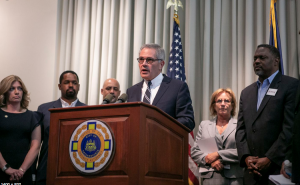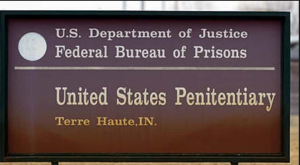
The Atlantic: The Time Bill Clinton and I Killed a Man
Source: The Atlantic “Strapped to a gurney, two body lengths from where I sat behind thick glass and a curtain, Ricky Ray Rector groaned each

Source: The Atlantic “Strapped to a gurney, two body lengths from where I sat behind thick glass and a curtain, Ricky Ray Rector groaned each
“Justice Thurgood Marshall was correct in 1972 when he predicted that if people were better informed about the death penalty, they would reject it. That

In his book, book, Six Amendments, U.S. Supreme Court Justice John Paul Stevens called for revising six of the amendments to the Constitution, including the

Death Penalty Focus has filed an amicus letter in support of a motion filed last month by death penalty lawyer and DPF board member Robert

“Anyone who claims to believe in the sanctity of life, truth, or justice cannot seriously defend the application of the death penalty in Pennsylvania,” Philadelphia
In Tennessee, the Tennessean reports Stephen West was executed by electric chair last night. He opted for electrocution over lethal injection, a choice available to
In his multi-part series, “We need to fix forensics. But how?” in the Washington Post, Radley Balko poses six questions to 14 experts who work

The “machinery of death” will shift into high gear in the next few months if the Department of Justice gets its way. On Monday, Attorney
Death penalty lawyer and DPF board member Robert M. Sanger believes that the moratorium Gov. Gavin Newsom announced in March created “a paradigm shift in

Oklahoma Gov. Kevin Stitt has issued a 60-day stay of execution for Richard Glossip. The stay is effective September 22, the day Glossip was scheduled to be executed. It is in effect until December 8, 2022. “This stay is granted to allow time for the Oklahoma Court of Criminal Appeals to address a pending legal proceeding,” the order states. Stitt is referring to a recent request by 61 Oklahoma lawmakers

The Texas Court of Criminal Appeals granted a stay of execution to Ramiro Gonzales earlier this month, two days before he was scheduled to be killed. The CCA, which is the state’s supreme court, ordered the trial court to consider Gonzales’s claim that his death sentence was based on false testimony. That testimony was provided by Dr. Edward Gripon, an expert witness for the prosecution who declared at Gonzales’s murder

Oklahoma’s plan to kill 25 men between next month and December 2024 has been met with outrage and disbelief. Former Oklahoma Gov. Brad Henry and former U.S. Magistrate Judge Andy Lester, co-chairs of the Oklahoma Death Penalty Review Commission, which issued a 300-page report in 2017 detailing the myriad flaws in the state’s capital punishment system, weighed in with an editorial in the Oklahoman this week. They noted that the

In California, three death sentences were overturned by state and federal courts in the past few weeks, the Death Penalty Information Center reports. “Richard Clark, Michael Bramit, and Andrew Lancaster were granted relief on claims related to defense counsel’s inadequate performance or jury-related issues,” according to DPIC. Clark (sentenced in 1987 in Santa Clara) and Bramit (sentenced in 1997 in Riverside) were granted new penalty phase trials, and a Los

In her New York Times piece, “After Parkland, One Question Remains: What Is Justice?”, Audra D. S. Burch writes about Tom and Gena Hoyer, whose son was killed in a mass shooting at Marjory Stoneman Douglas High School in Parkland, Florida in 2018. Fifteen-year-old Luke Hoyer was one of 17 students and teachers killed in the shooting, which also injured 17 others. A penalty trial is now underway for the

“It was so frustrating to see these horrible, untrue claims go unconfronted. I felt I could go after them and call them out for what they are — absurd.” Dr. Philip Hansten is explaining what inspired him to write his new book, Death Penalty Bullshit: Fifteen Absurd Claims of Death Penalty Supporters, and why he gave it what some might consider a controversial title. “It’s an accurate description. We have

Amnesty International called on President Biden to make good on his 2020 campaign promise and abolish the federal death penalty, and commute the sentences of the 44 men on federal death row. The 114-page report, “The Power of Example: Whither the Biden Death Penalty Promise?”, was released late last month to coincide with the 50th anniversary of Furman v. Georgia, the U.S. Supreme Court decision that struck down the death

The Death Penalty Information Center marked the 50th anniversary of Furman v. Georgia by releasing a census of death sentences handed down from June 29, 1972 — the day the U.S. Supreme Court abolished the death penalty in Furman — through January 1, 2021, and the status of each sentence. “The data provide powerful evidence that the nation’s use of capital punishment continues to be arbitrary, discriminatory, and rife with

In our June Focus newsletter, we covered how Oklahoma’s attorney general has asked for execution dates for 25 men who have exhausted their appeals, but have valid innocence claims still unresolved. The most well-known among these men is Richard Glossip, who was sentenced to death in 1997, convicted of engineering the murder of Barry Van Treese, the owner of a motel where Glossip worked. The actual killer, Justin Sneed, serving
Death Penalty Focus
500 Capitol Mall
Suite 2350
Sacramento, CA 95814
Tel: 415-243-0143
information@deathpenalty.org
Federal Tax ID# 95-4153420
DPF is a 501C3 non-profit organization

In Special Consultative Status with the UN Economic and Social Council since 2017
